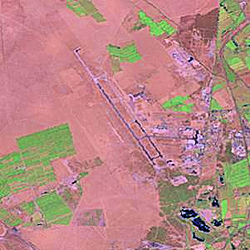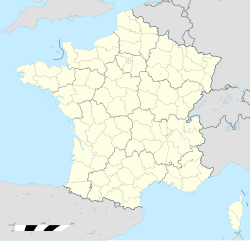Istres Air Base
Istres-Le Tubé Air Base Base aérienne 125 Istres (BA 125) Advanced Landing Ground (ALG) Y-17 |
|||||||||||
|---|---|---|---|---|---|---|---|---|---|---|---|

Landsat 5 satellite image - false color infrared
|
|||||||||||

Aerial photo of Istres Air Base
|
|||||||||||
| Summary | |||||||||||
| Airport type | Military | ||||||||||
| Owner | Government of France | ||||||||||
| Operator | French Air Force | ||||||||||
| Location | Istres | ||||||||||
| Elevation AMSL | 162 ft / 49 m | ||||||||||
| Coordinates | 43°31′28″N 4°56′30″E / 43.52444°N 4.94167°ECoordinates: 43°31′28″N 4°56′30″E / 43.52444°N 4.94167°E | ||||||||||
| Map | |||||||||||
| Location of Istres-Le Tubé Air Base | |||||||||||
| Runways | |||||||||||
|
|||||||||||
|
Source: DAFIF
|
|||||||||||
Istres-Le Tubé Air Base (French: Base Aérienne 125 or BA 125) is a large multi-role tasked French Air Force base located near Istres, northwest of Marseille, France. The airport facilities are also known as Istres - Le Tubé (ICAO airport code: LFMI).
The user of the base is the French Air Force with several operational units on the base, including:
The base also hosts a helicopter squadron and a large repair and training facility. In addition, it also includes EPNER (École du Personnel Navigant d’Essais et de Réception); test facilities for DGA, Dassault Aviation, SNECMA, Thales and some aeronautical units of the French Navy. More than 5,000 personnel work on the base.
Secondary users occasionally include the United States Air Force (USAF), during Allied operations engaging United States and France. During Operation Allied Force, USAF KC-135s and U-2s operated out of the base. Istres was the home of U-2 detachment OL-FR (Operating Location-FRance). Istres was also utilized by NASA as a contingency landing site for the Space Shuttle in the case of a Transoceanic Abort Landing (TAL). The base's runway is 3,750 metres (12,300 ft) long and 60 metres (200 ft) wide. An additional overrun area 1,200 metres (3,900 ft) long was built for Airbus Industries in 1992. It has the same characteristics as the runway, making it the longest runway in Western Europe and thus suited to Shuttle landings.
On 31 March 1992, a Boeing 707 of Kabo Air, a Nigerian company, made an emergency landing at Istres after engines 3 and 4 had separated from the wing in turbulence at 35,000 feet. The aircraft performed a flapless, downwind landing with a touch-down speed of nearly 200 knots and the right wing on fire from the pouring fuel. The gear failed and the aircraft slid off the far end of the runway, but the crew of five survived and the cargo was saved. The incident brought to light severe deficiencies in Kabo Air's operations — the aircraft had passed mandatory maintenance and was overloaded.
...
Wikipedia

